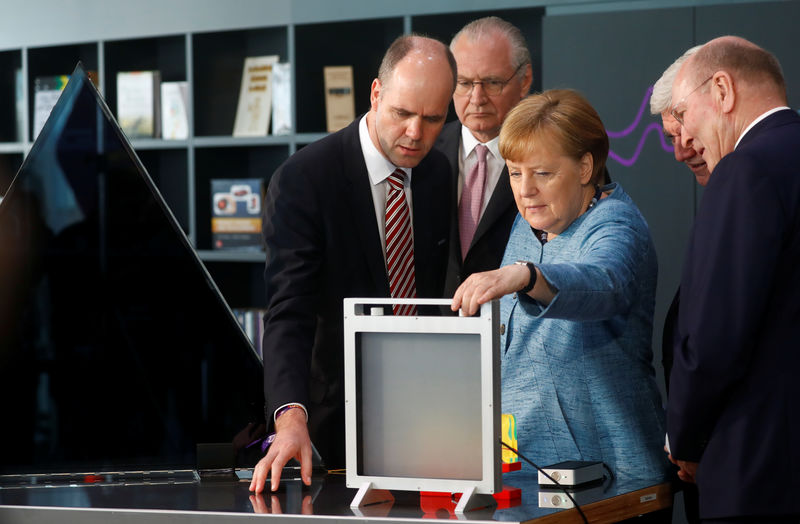By Paul Carrel and Michael Nienaber
BERLIN (Reuters) - As Europe's biggest exporter to the United States and with more than 1 million German jobs at stake, Germany is desperate to avoid a European Union trade war with the United States.
In the run-up to a June 1 deadline for U.S. President Donald Trump to impose steel and aluminum tariffs on the EU, Berlin is urging its European partners to show some flexibility and pursue a broad trade deal that benefits both sides.
But that puts Germany at odds with European peers such as France. Paris, the other half of the motor driving European integration, resents Germany's big trade surplus and wants a tougher EU stance against the U.S. tariffs.
"There is a great danger of slipping into a trade war that way," Holger Bingmann, president of Germany's BGA foreign trade association, told Reuters.
Mindful of data from the German-American Chambers of Industry and Commerce that shows more than 1 million German jobs are directly or indirectly dependent on exports to the United States, he cautioned against EU threats of counter tariffs.
"That way, the Europeans would only embrace the logic of protectionists," he said.
The European Commission has said the EU will set duties on 2.8 billion euros ($3.36 billion) of U.S. exports, including peanut butter and denim jeans, if its metals exports to the United States, worth 6.4 billion euros, are subject to tariffs.
Berlin is pushing the idea of an agreement to lower tariffs across a broad spectrum of products, especially in manufacturing.
"We can negotiate again ... but we should talk about all industrial tariffs," said a senior German official.
A French official said there must first be a permanent and unconditional exemption for the EU from the steel and aluminum tariffs, adding: "That's the prerequisite for any other option."
Such differences risk driving EU countries apart, weakening their bargaining position with Trump - playing into his hands as he tries to make U.S. businesses more competitive globally.
German Economy Minister Peter Altmaier said on Wednesday that finding a common stance with France and formulating an offer to the United States were "equally difficult".
So far, Germany and France's differences have largely been hidden behind the EU position that Washington must give it a permanent exemption from the steel an aluminum tariffs.
But as the June 1 deadline nears, EU trade ministers must resolve their differences quickly to give European Trade Commissioner Cecilia Malmstrom a clear mandate for negotiations with the U.S. administration.
"BUILD BETTER CARS"
Concerned that a tit-for-tat escalation of tariffs could affect them next, German carmakers are trying to mitigate their exposure to any trade war.
BMW has quietly stopped exporting its X3 offroader from the United States to China, retooling its factory in Shenyang, China to produce the X3 model locally. The X3 is now also produced at a plant in Rosslyn, South Africa.
But any switch from one factory to another is costly, takes months to plan and implement, and is taken with a long-term view, BMW board member Peter Schwarzenbauer said.
"We have to make decisions, like about factories in Spartanburg (South Carolina) or factories in Mexico, which are based on a horizon of 20 to 30 years," he told Reuters in March.
"If we were to change our strategy whenever a tweet comes out, we would get crazy," he added.
Tensions around the car sector have been stoked on both sides of the Atlantic.
In January 2017, when he was president-elect, Trump complained there were many Mercedes-Benz luxury cars visible on New York streets and threatened to impose a border tax of 35 percent on vehicles imported to the United States.
Sigmar Gabriel, then Germany's economy minister, replied that the United States should "build better cars".
Gabriel's comments reflect the pride Germans feel in the quality products their country exports, a post-war success that has helped them regain respect and recognition abroad.
SURPLUS TENSION
Yet the surpluses this success has brought are a bone of contention that affect Germany's relations with its peers.
France has complained for years about Germany's current account surplus -- a measure of the flow of goods, services and investments -- which was the world's largest for the second year running in 2017.
The head of the International Monetary Fund said in January the build-up of large current account surpluses in countries such as Germany was partly responsible for the rise of protectionism elsewhere.
France wants Germany to steer its surplus towards economically weaker southern Europe and raise domestic investment to reduce the surplus.
So too does the IMF and the United States, hoping that an increase in investment would stimulate domestic demand in Germany and help boost imports from its trading partners.
German Finance Minister Olaf Scholz presented government finance plans on Wednesday that showed investment rising this year and next, before decreasing through to 2022 to below the 2017 level.
German Chancellor Angela Merkel discussed trade with Trump in Washington last week but there was no sign of a breakthrough.
In 2017, German exports to the United States reached 112 billion euros, more than twice the next biggest EU country, Britain, according to the Eurostat statistics office.
"Germany's problem is a lack of realism with respect to its own fragile strategic situation," said Jan Techau, a director at The German Marshall Fund of the United States, a think tank.
He said Berlin also showed a lack of awareness of the consequences of its economic policies and failed to realize "its own strategic long-term interests are largely similar to those of the U.S."

($1 = 0.8335 euros)